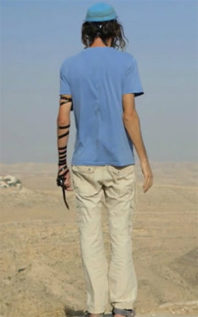
Yossi Fruman talks directly to the camera and says “I’m a settler,” stating this fact happily for no good reason. Happiness is a destination for this rabbi. He adds in Hebrew that “I hope to remain bound to (this land) until I am buried in it”. There are many people who share his sentiments.
I used to think of happiness as a blank state that adults my age or his are incapable of achieving. (I’m 29, he’s 38). Not in my circumstances and definitely not his. But I was wrong I guess. Because his circumstances are more peculiar to say the least. His happiness is the opposite of the rest of what we’ll see in Shimon Dotan’s documentary The Settlers.
Yossi is one of 400,000 settlers in the West Bank. In one perspective, Yossi and his family have every right to live in the land he loves. However, The Settlers gives context to the history and legality of Jews settling in the West Bank. Because context is what this conflict needs. Headlines have reduced this issue as one where fanatics oceans away hate each other enough to kill.
The film is as controversial as the conflict it covers. The talking heads spend a lot of time remembering things. And I hinged on every word. The way they retell history and the words they use reveal something in this ongoing section of human history. It would thus not surprise me to hear or read discussions after the credits roll.
On an official basis, the Israeli government does not approve of its citizens living in that territory. Here, Dotan puts together the conflicting views of the settlers, their rabbis, and secular Israeli professors. The latter reminds us that these settlers live in a territory that the State of Israel technically doesn’t control. Also, they are citizens living in foreign land. Living with people they consider foreign. Palestinians.
Talking heads help Dotan paint a historical picture of how the settler movement began. Each segment begins with a title card that looks like woodblock prints. Those images depict Biblical violence playing out in our contemporary times. Then there are the monochromatic archive footage of innocent yeshivas. Dotan adds eerie music to these visuals. The way he presents these facts remind me of an effective horror film.
Those yeshivas quickly turn into rallying speeches about the land they want to reclaim. The movement began during 1967, when Israel fought the Six Day War and yet elected more moderate rulers. The settlers had their unofficial status but Prime Ministers like Golda Meir would visit these outposts. Any sign of tolerance, therefore, became a symbol of support for the settlers who wielded more and more political power.
Dotan miraculously makes makes a fact based documentary compelling. His camera occasionally hovers through the landscape with dread. He equally imbues this same quality when he points his lens as people. I’m starting to learn that I love documentaries that are unafraid to capture the dark side within people. Or to let them reveal their violent secrets.
- Release Date: 3/17/2017


